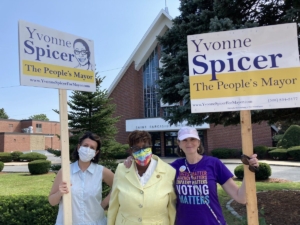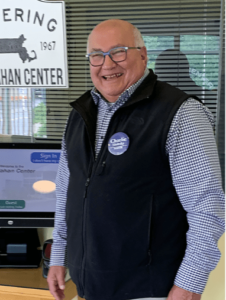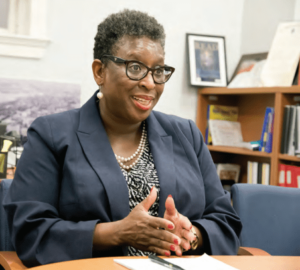Yes Framingham Blue Sign What Means John Stephanini Framingham
FOUR YEARS AGO , voters swept Yvonne Spicer into office as Framingham's first mayor, heralding a new chapter for the community of 72,000, which had outgrown the town government structure that operated there for more than 300 years. Her inauguration was a celebratory moment of promise, with Sen. Elizabeth Warren and US Rep. Katherine Clark holding the Bible as Spicer took the oath to become not only Framingham's first mayor, but the first Black woman popularly elected to a mayor's post in state history.
Now, the same voters who delivered a decisive victory to Spicer seem poised to send her packing.

In the September 14 preliminary election, Charlie Sisitsky, a 76-year-old former city councilor and longtime civic player in Framingham, trounced Spicer by a more than 2-to-1 margin. In the three-way mayoral preliminary, which eliminated a minor candidate who got fewer than 400 votes, Sisitsky received 4,401 votes to Spicer's 1,938.
What's gone wrong for the 59-year-old educator, who bills herself "The People's Mayor," depends on whom you ask. The problems have either been the result of self-inflicted wounds from a novice politician who resisted calls for greater communication and collaboration with other officials, or the product of the determined efforts of Framingham's "old guard" to trip up the city's new leader right out of the gate.
Whatever the reasons, there is little doubt that Spicer is now an underdog heading into the November 2 final election, an unusual position for an incumbent officeholder.
Spicer was charged with helping establish a new form of governance in Framingham, which had been overseen by a town manager handling administrative duties, with policymaking divided between a five-member board of selectmen and a 216-member elected town meeting. Critics said it was an unwieldy structure in such a large community, and residents narrowly voted to replace it in early 2017 after several previous failed efforts to approve a charter change.

Framingham Mayor Yvonne Spicer with supporters. She says her base didn't turn out for the September preliminary but will in November. (Twitter photo)
In January 2018, Spicer took office as the first mayor of the new city of Framingham, along with an 11-member city council. Things seemed to go badly from the start.
Spicer took it as a bad sign when the incoming chair and vice chair of the new city council decided to hold a separate celebration from the inaugural festivities accompanying the mayoral swearing-in. "There's been a campaign against me since Day 1," she said.
In the nearly four years since then, relations with the city council have only deteriorated, punctuated by the public release last year of text messages in which Spicer hurled curse-word characterizations of city councilors.
Critics say Spicer hasn't appreciated the role of the council in the new governing structure and has a go-it-alone style that alienates other city leaders. Meanwhile, former allies, including two liberal state reps representing Framingham who were excited by Spicer's progressive agenda, have jumped ship to support her challenger, an ominous sign for her reelection chances.
Jacquetta Van Zandt, who served as senior adviser for external relations in the mayor's office during Spicer's first 18 months in office, said her win took people by surprise and some recoiled at her use of power under the new charter that vests lots of authority in the mayor.
"She met with a lot of resistance from the new city council," said Van Zandt. "That was set up for the current gatekeepers in Framingham," she said of the new city government structure. "I think because of that, they tried to strip her of a lot of power in the mayor's office."
That included an early move by council to cut the budget for the mayor's office, said Van Zandt, forcing Spicer to let go of a part-time policy aide.
Spicer, who was born in Brooklyn, arrived in Framingham in 1985 as a middle school woodworking teacher. She briefly served as elected town meeting representative, but had little experience in local politics or municipal government before being elected mayor. She went from classroom teacher to administrator in Newton schools, received a doctorate in education, and was serving as vice president for advocacy and educational partnerships at the Museum of Science in Boston at the time of the 2017 election.
"New voices coming into local government — it's difficult to do here. We have a pretty well organized political establishment," said Cesar Stewart-Morales, a first-term city councilor who was born in Guatemala and arrived in Framingham during middle school. "All of the tension that exists between the city council and the mayor's office was there on Day 1," said Stewart-Morales, one of only three city councilors publicly backing her reelection.
To her critics, Spicer took office with little willingness to work collaboratively with other city leaders and little understanding of municipal government.
"Choosing to operate alone is really the number one issue if you ask what went wrong," said City Councilor Janet Leombruno. "She flies solo," Leombruno said of Spicer's approach.
Sisitsky, who was elected to the new city council when Spicer was elected mayor, said everyone was in the same boat as the new city government got off the ground. "I was on that first council and it was a learning period for all of us," he said. "We had a brand new charter. But the way she went about it was instead of learning with the council together, she put on blinders and said, I don't care about your role, I don't care about your advice. This is what I'm going to do."

Charlie Sisitsky says he'll bring his years of municipal experience to the mayor's office in Framingham if elected. (Campaign photo)
Spicer tells a different tale. "I have built partnerships my entire professional career," she said, noting that the term was even part of her title at the Museum of Science. Spicer said she has reached out to council members, but not all of them have been receptive. " I've called them and tried to bring them in to give me ideas for their respective districts," she said. "Some have taken me up on it."
Already frayed relations reached a low point last fall, when a local news website called "Framingham Source" published text messages , obtained from a public records request, that Spicer exchanged with the city's chief operating officer.
Apparently reacting to critical comments made by councilors about city employees, Spicer texted COO Thatcher Kezer: "You know I can't take this because they're assholes in my opinion!!"
"Some of them I swear they are the most disgusting human beings I've ever met," Spicer added. She also took aim at two councilors who were often supportive of her efforts, calling them "disappointments" and saying that in a meeting scheduled for the following day with one of them, she planned to "call her on her bullshit."
Spicer says she addressed the release of what she thought were private messages and worked to move on. "It was unfortunate. I apologized for it in writing and publicly apologized," she said of the events from last fall.
At the time of the incident, Spicer also sought to provide some context for her sharp words. She said in a statement that some councilors have sought to work constructively, but others "lob insults from the viewing stands, which helps no one," according to a MetroWest Daily News story at the time.
A faction of the council has treated Spicer "with disrespect during the entire four years," said City Councilor Margareth Shepard. "Which of course brings out the worst of everyone. And of course the mayor is a human being. At some point your emotions flow as well," said Shepard, the first Brazilian-born woman elected to a city council in the country.
While some of the tension and division in city politics may be left over from the 2017 mayor's race, much more damaging to Spicer has been the loss of some of high-profile supporters who have grown disillusioned with her leadership.
Both of Framingham's liberal Democratic state representatives, Jack Lewis and Maria Robinson, have endorsed Sisitksy, as has the chairman of the school committee, Adam Freudberg, who supported Spicer in 2017.
" I voted for Mayor Spicer four years ago," said Lewis. "I had, like so many others, such great hope not only for her candidacy and what that would mean for Framingham, but great hope for what she would be able to do as mayor."
But speaking at Sisitsky's campaign kickoff in May, Lewis said it was time for change.
"I spent the first several years of her tenure urging my friends and neighbors to be patient, to give her time to get her bearings straight," he told Sisitsky supporters . "Instead, over the last four years, when our city most needed to be united, our current mayor alienated not just her political enemies that she paints with a broad stroke, day in and day out, we know that she alienated her friends, her allies, and those who are most willing to partner with her in this work."
In some of the rifts, the disagreement extends to even the basic facts at play.
When the pandemic broke out in March 2020, Lewis said, he and Robinson heard from State House colleagues about municipal leaders in their districts who were organizing daily meetings or conference calls that included all city and state officials in the community coming together amid the crisis. Lewis said he learned Framingham had been holding such a daily confab among city officials, but leaders of the city council and the city's State House delegation had not been included.
"That's not true. It's simply not true," said Spicer. "From the onset of doing these meetings, they were a part of it."
She said she was "baffled" by Lewis's endorsement of Sisitsky, saying he never reached out to have a conversation with her about it. As for Robinson, Spicer said they had been "Emerge sisters," referring to a national organization that recruits and trains Democratic women candidates for office. "So I don't really understand it," she said of the lawmaker's endorsement of her opponent.
Robinson, who was nominated last week to an assistant secretary position in the Department of Energy in the Biden administration, didn't return messages asking about the race.
Spicer has also faced criticism over nuts-and-bolts issues, most prominently a multimillion-dollar deficit in the city's water and sewer fund. Larger users are charged higher rates, and there was a steep drop in revenue when commercial payers and office buildings suddenly closed and their water usage plummeted amid the pandemic shutdown.
Some one-time federal relief money was used to plug the gap. Freudberg, the school committee chairman, said Spicer also sought a cut in the school department budget to help make up for the shortfall.
In July, the city announced a nearly 10 percent rate increase in water and sewer charges as part of the effort to address the problem. Spicer said she inherited a policy dating to 2015 of not increasing water rates more than 2.5 percent a year. "We are looking at how to adjust the rate structure," she said, noting that the city is otherwise in fiscally sound condition.
Critics say it was her job as mayor to reset rates to account for rising costs that occurred even before the pandemic, regardless of past practice. "In order to keep the rates artificially low, she burned through all the reserves," said Sisitsky, who vows to bring his decades of municipal management experience, including serving as public works director in neighboring Natick, to city government if elected mayor.
Shepard, the city councilor who said Spicer has faced disrespectful treatment from the start, said her tenure hasn't been perfect. " I see that some mistakes were honest mistakes and some was lack of public administration experience," she said. Spicer has been on "the learning road," Shepard said, but the public perception of her performance has been distorted by city councilors operating "maliciously" to undermine the mayor. Shepard pointed to budget cuts in 2020 during the pandemic that meant seasonal employees could not be hired, as usual, to work at the city's parks and recreation areas last summer.
"After the cuts were made and residents started complaining, the conservative side of the city council that made the cuts was also criticizing the administration," said Shepard, who supports Spicer's reelection effort.
Looming over the issue of Spicer's tenure are questions of whether race or gender have played roles in the criticism she's faced and her rocky relationship with other leaders.
"Absolutely," said Spicer. "I've been the first of many things," she said of the scars she bears from breaking barriers of gender and race at various points in her life. She cited a line used by Suffolk County District Attorney Rachael Rollins: " Yes, we are women breaking glass ceilings. But we also are the first getting cuts in the head."
Framingham's population is 70 percent white, with 16 percent of residents Latino, 8 percent Asian, and 7 percent Black.

"I've been the first of many things," said Framingham Mayor Yvonne Spicer. She says women are breaking glass ceilings — but as consequence also become the "first getting cuts in the head." (Photo by Frank Curran)
Lewis, the local state rep now backing Spicer's opponent, said racism has unquestionably been part of the equation facing the mayor. "I saw the unreasonable expectations, and mistreatment and inappropriate comments made to her and about her by some in Framingham," said Lewis, who is white. He said he urged residents to "stand up to the hate and racism that was becoming more and more commonplace in public conversations and online."
He called it an "uncomfortable" situation to decry the racism Spicer has faced while also criticizing her performance and urging residents to vote her out. "All I can say is, at the city level, when it comes to management and missed opportunities, things are truly that bad," said Lewis.
Spicer says she's hopeful that her fortunes will be reversed in the November election. The preliminary election only saw 6,700 voters cast ballots, a turnout of 17 percent. More than 15,000 people voted in the final election four years ago in which she defeated former state rep John Stefanini by more than 2,500 votes.
"I was disappointed," Spicer said of this month's preliminary election results. "He got his base out, my base stayed at home," she said of the big margin rolled up by Sisitsky. "When I won, 9,128 people voted for me," she said of the 2017 election. "I need to go out and find those votes."
"She's got a fight ahead of her, I'll say that," said Van Zandt, the former external relations adviser in the mayor's office.
Reflecting on the challenging first term of the city's first mayor, Van Zandt said there's always room for improvement in dealings between public officials. "Politics is a very relational business, but it's a two-way street," she said. "Could she have cultivated relationships differently?" she said of Spicer. "Probably."
For her part, Spicer said she's ready to turn over a new leaf. "Whatever challenge or difficulty I am having with the council, I am in this to work it through and for the betterment of my city," she said. "If I'm fortunate enough to be reelected, I will work to find new ways to build relationships with this city council and make us all accountable for this relationship."
Spicer likened the rocky start to Framingham's new life as a city to a child learning to walk. "We are a toddler city, we are three and a half years old as a city," she said. "Toddlers walk, they trip, they get back up."
Source: https://commonwealthmagazine.org/politics/what-went-wrong-for-framinghams-1st-mayor/

0 Response to "Yes Framingham Blue Sign What Means John Stephanini Framingham"
Post a Comment